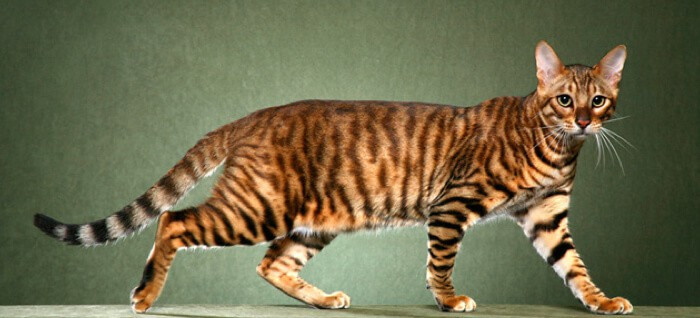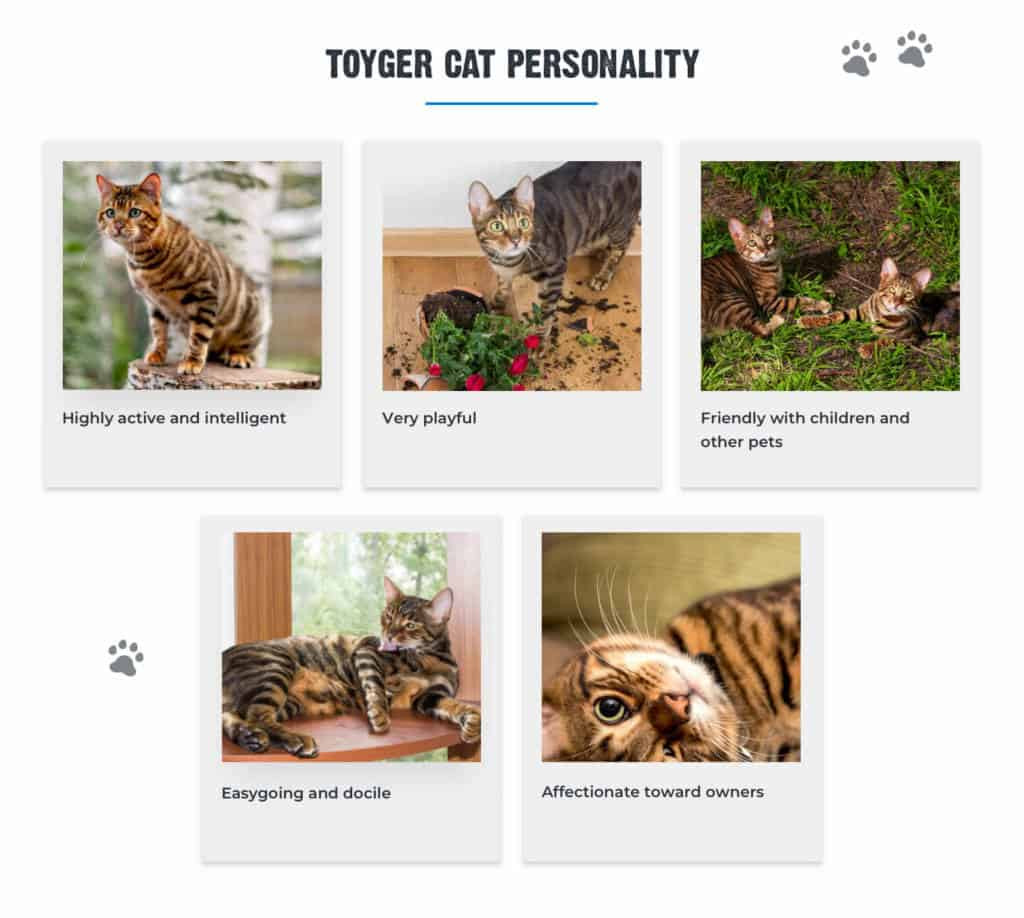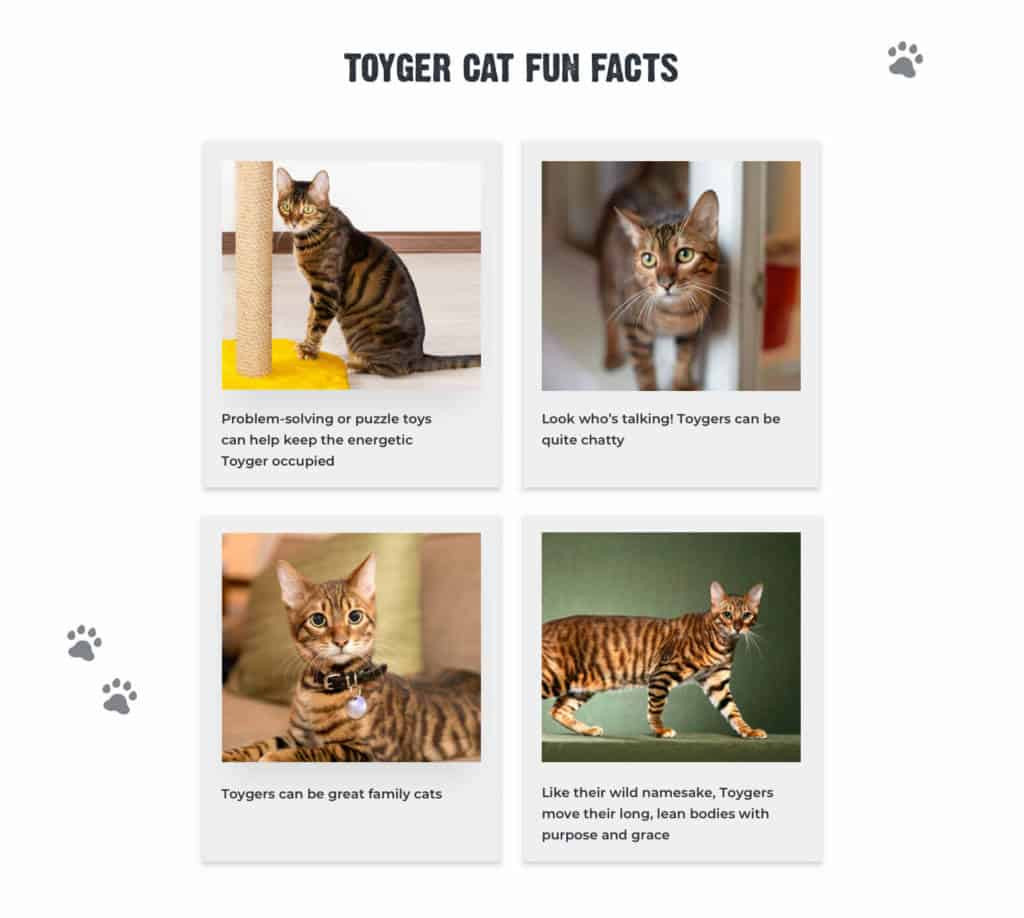With their striking striped coats and muscular builds, Toyger Cats bring the allure of the jungle into your home. These captivating felines, bred to resemble miniature tigers, are more than just a pretty face. Toyger cats boast a friendly and engaging personality, making them wonderful companions for families and individuals alike. Dive into the fascinating world of toyger cats and discover what makes this relatively new breed so unique and desirable.
The Genesis of the Toyger Breed
The story of the toyger cat began in the 1980s, driven by the vision of Judy Sugden, daughter of Jean Mill, the pioneering breeder behind the Bengal cat. Inspired by her mother’s work in creating miniature leopards, Sugden sought to develop a domestic cat breed that mirrored the majestic tiger. Her journey commenced with the crossing of a striped domestic shorthair named Scrapmetal and a Bengal named Millwood Rumpled Spotskin. This pairing marked the inception of the toyger cat breed. Despite their growing popularity, toyger cats remain relatively rare, which can sometimes make finding reputable breeders a bit of a quest.
The name “Toyger” itself is a clever portmanteau, blending “toy” and “tiger,” perfectly encapsulating the breed’s objective: to create a domestic cat that embodies the appearance of a tiger in miniature form. Beyond aesthetics, Sugden’s ambition for the toyger cat breed extended to raising awareness about the critical need for wild tiger conservation.
Due to their rarity and the specialized breeding programs, toyger kittens can command prices ranging from $1,500 to $5,000. It’s heartening to note that some toyger breeders, echoing Sugden’s initial vision, dedicate a portion of their earnings to tiger conservation efforts. If you are considering welcoming a toyger into your family, it’s crucial to thoroughly research breeders, ensuring their integrity and, if conservation is important to you, verifying if they contribute to tiger protection initiatives.
The Alluring Appearance of Toyger Cats
 Alt text: Close-up portrait of a Toyger cat showcasing its distinctive striped coat and bright green eyes.
Alt text: Close-up portrait of a Toyger cat showcasing its distinctive striped coat and bright green eyes.
Toyger cats undeniably live up to their name, possessing an uncanny resemblance to miniature tigers. Among all domestic cat breeds, the toyger cat stands out as the most visually similar to the iconic wild tiger, albeit in a significantly smaller, domesticated package.
Classified as a medium-sized breed, toyger cats exhibit a robust and muscular physique, characterized by elongated bodies, prominent shoulders, and rounded heads. Their tiger-like persona is further enhanced by proportionally shorter legs compared to many other breeds, a trait shared with their larger wild cat counterparts. This physical attribute lends toyger cats a distinctive “prowling” gait as they move around their environment, further amplifying their wildcat charm. Adding to their impressive features are their long toes and substantial paws.
Toyger Coat Color: A Striped Masterpiece
The toyger cat boasts a short yet dense coat with a luxurious, silky texture. The base coat typically presents in shades of brown, reddish-brown, or a deep, rich orange. This canvas is adorned with striking dark tabby stripes that boldly traverse the body, complemented by distinctive circular markings embellishing the head. To preserve the lustrous sheen and healthy condition of their dense coats, regular weekly brushing is recommended for toyger cats.
Eye Color: Piercing Gaze
Toyger cats are known for their large, captivating, round eyes. The eye color spectrum ranges from a vibrant light hazel to a deep, expressive dark brown, further enhancing their striking, tiger-like appearance.
Toyger Cat Biology and Health Considerations
Toyger cats are generally recognized as a healthy breed. However, given their relatively recent development and rarity, ongoing research is essential to gain a more comprehensive understanding of their breed-specific health predispositions.
Current findings suggest that toyger cats may exhibit a higher incidence of heart murmurs and hypertrophic cardiomyopathy (HCM) compared to the broader feline population, as noted by veterinary resources. Therefore, selecting a reputable breeder who prioritizes the health of their cats and refrains from breeding individuals with known cardiac conditions is paramount for maintaining the breed’s overall well-being and integrity.
Weight Management and Nutritional Needs
Similar to Bengal cats, toyger cats often appear larger and more substantial than their actual weight might suggest. Typically, adult female toyger cats weigh between seven and ten pounds, while adult males average between ten and fifteen pounds.
Toyger cats are known for their high energy levels, mirroring their Bengal relatives. This inherent activity often aids in maintaining a healthy weight. To support your toyger cat’s weight and overall health, providing a high-quality cat food is crucial. Opt for diets formulated with minimally processed ingredients that align with their obligate carnivore nutritional requirements.
Toyger Cat Life Expectancy
Toyger cats typically enjoy a lifespan of 10 to 15 years. The precise lifespan of each toyger cat is influenced by various factors, including their individual health status and lifestyle, particularly whether they primarily live indoors or outdoors.
The Engaging Toyger Cat Personality
 Alt text: A playful Toyger cat interacting with a human hand, showcasing its friendly and interactive personality.
Alt text: A playful Toyger cat interacting with a human hand, showcasing its friendly and interactive personality.
Beyond their captivating physical appearance, toyger cats are equally celebrated for their delightful personalities. They are known to be outgoing, sociable, and remarkably friendly, even demonstrating trainability akin to their Bengal cousins. Some toyger cats have been successfully trained to walk on leashes, engage in games of fetch, and even participate in agility competitions.
As an intelligent breed, toyger cats thrive on mental stimulation. Ensuring daily interactive playtime is essential to prevent boredom, which can sometimes manifest as destructive behaviors in intelligent and under-stimulated cats.
Fun Facts About Toyger Cats
 Alt text: A collage of three Toyger cats in different poses, highlighting their playful nature and tiger-like stripes, with the text “Fun Facts About Toyger Cats”.
Alt text: A collage of three Toyger cats in different poses, highlighting their playful nature and tiger-like stripes, with the text “Fun Facts About Toyger Cats”.
- The stripes on a Toyger cat are designed to be vertically aligned, like a tiger’s, rather than the circular patterns seen in some tabby cats.
- Toyger cats are known for their love of water, often enjoying playing with or even in water, unlike many domestic cats.
- Despite their wild appearance, Toyger cats are entirely domestic and have no wild cat lineage beyond the initial Bengal cross.
- The Toyger cat breed is still considered “developing” by some cat registries as breeders continue to refine the breed standard, particularly regarding head shape and ear shape to further enhance the tiger resemblance.
- Toyger cats often retain a playful, kitten-like energy well into adulthood.
Frequently Asked Questions About Toyger Cats
Q: Are Toyger cats hypoallergenic?
A: It’s a common misconception that certain cat breeds are hypoallergenic. In reality, no cat breed is truly hypoallergenic. Allergies are typically triggered by dander (dead skin flakes) and a protein found in cat saliva. While some breeds, like the Sphynx and Devon Rex, are known to produce less dander and saliva, toyger cats are not specifically recognized as being hypoallergenic.
Q: Do Toyger cats get along with children and other pets?
A: Yes, toyger cats are generally known for their amiable and tolerant nature, often getting along well with children and other pets, including cat-friendly dogs. However, as with any cat breed, individual personalities can vary. It’s always prudent to assess a specific toyger cat’s temperament when introducing them to new family members or pets.
Q: Where can I find a Toyger cat breeder?
A: Toyger cats are still a relatively rare breed. For those seeking a toyger cat, reputable breeders are the best source. The International Cat Association (TICA) website provides a directory of registered toyger breeders, which can be a helpful resource in your search. It’s important to research breeders thoroughly to ensure ethical breeding practices and the health and well-being of the kittens.
If you’re captivated by the idea of owning a miniature tiger with a heart of gold, the toyger cat might just be the perfect breed for you.
